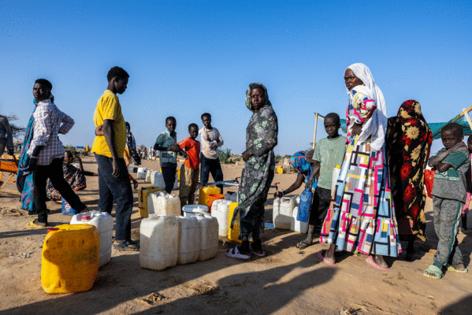Commentary: Horrifying violence returns to Sudan, exposing the deadly legacy of impunity
Published in Op Eds
Twenty-two years ago, the devils came on horseback. Now they come on pickup trucks mounted with machine guns, funded by gold and assisted by drones. Now, the devils fight against the Sudanese Armed Forces (SAF) rather than for it, and they’re doing so with more efficient tools. But if you’re a civilian in Darfur, the outcome is the same: genocide.
The conflict in Sudan today differs somewhat from the war in Darfur in the early 2000s, when the government in Khartoum was the instigator and the Janjaweed militia did its dirty work. Today’s war pits the SAF, led by Gen. Abdel-Fattah Burhan, against the Rapid Support Forces (RSF), led by Mohammed Hamdan “Hemedti” Dagalo. But, in Darfur, history just seems to be repeating itself, since the RSF is little more than the rebranded Janjaweed, and Hemedti was one of their commanders.
Like then, the violence is gut-wrenching. The United Nations Human Rights Council released a report from an independent fact-finding mission that found that the RSF “carried out large-scale and systematic attacks on civilians,” including mass killings, murder, torture, rape, sexual slavery and “destruction of essential survival objects.” The report called out the SAF for human rights violations as well, but of a less sadistic variety.
Notably, this report was released before the latest horrors were unleashed on the population of el-Fasher, the last major city of Darfur to succumb to the RSF when it fell in the final days of October.
One need not imagine the atrocities. The rebels helpfully documented themselves and plastered it across social media. Smiling killers cheer on the violence, some proudly proclaiming it genocide as they display and celebrate their executions in action. Women and children are among the victims. Satellite images add to the picture, with piles of bodies and pools of blood so large they are visible from space. None of the guilty in the videos bother to hide their faces or RSF badges. The RSF reportedly shot and killed 460 patients and family members at a maternity hospital, the last remaining functioning hospital in the city. About 86,000 people have managed to flee, but that means about two-thirds of the population didn’t.
This nightmare came after 18 months of siege. The RSF surrounded el-Fasher with a 35-mile sand wall to block food and humanitarian aid from entering the city and people from escaping it. Medical teams in the refugee camp at Tawila 43 miles away call the malnutrition rates of survivors “ staggering.”
Since the beginning of this siege, experts and Sudanese activists alike have warned of this outcome. Nothing about this is surprising, except the total lack of attention the world has paid to it.
Joe Biden’s administration was more concerned than the Donald Trump administration has been so far, but that didn’t translate to real pressure on the warring parties. At least then the U.S. Agency for International Development (USAID) was negotiating ways to deliver more aid.
It’s all a far cry from the international reaction to the last Darfur genocide, though, when Congress and the U.N. Security Council (UNSC) were frequently engaged, and international partners worked with multilateral institutions to negotiate ceasefires and peacekeeping missions. The UNSC then even referred Sudan to the International Criminal Court (ICC). In contrast, the UNSC has barely commented on this war in two years, and the last full congressional committee hearing was a year and a half ago. Even with high levels of attention before, the Darfur genocide lasted years and killed an estimated 300,000 people. That doesn’t bode well for an end to this nightmare.
Sudan proves once more that the mantra, “Never again,” only means: “Not until next time.” But the shame of this genocide is unique, since the offenders include many of the exact same people as the last one. If Hemedti and his cohort were behind bars from their last genocide, they’d be a lot less likely to be leading one today.
Impunity has driven cycles of violence in Sudan for generations. The ICC is already investigating this and many other atrocities of this war, but there is slim hope that any perpetrators will pay a real price. Just last month, the ICC issued the first and only conviction for crimes committed in Darfur 21 years ago. This only occurred because the Janjaweed leader turned himself in after Sudan’s military coup in 2020. He apparently thought international justice was his best option, since he expected the coup leaders would kill him. It’s no wonder RSF rebels feel at liberty to advertise their crimes.
For these cycles of violence to end, the perpetrators must pay a price, but so, too, must those who bankroll and support them. In this case, that’s the United Arab Emirates, a close American security partner. Many other outside actors are involved in Sudan, but the UAE is the most consequential. Without its support, particularly its market for billions of dollars in black-market gold, the RSF would struggle to maintain the fight at all.
The U.S. government declared that the RSF was committing genocide in Darfur back in January, but that did little to meaningfully change America’s approach to the conflict. It’s past time for the United States to use its influence on the UAE to help stop this war, which has already killed hundreds of thousands and forced more than 12 million to flee their homes. If Trump wants a Nobel Peace Prize, this is where he could find it.
____
Elizabeth Shackelford is a senior adviser with the Institute for Global Affairs at Eurasia Group and a foreign affairs columnist for the Chicago Tribune. She is also a distinguished lecturer with the Dickey Center at Dartmouth College. She was previously a U.S. diplomat and is the author of“The Dissent Channel: American Diplomacy in a Dishonest Age.”
___
©2025 Chicago Tribune. Visit at chicagotribune.com. Distributed by Tribune Content Agency, LLC.
























































Comments